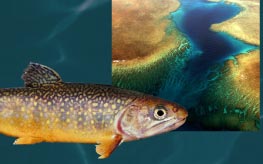2 November
Elena Bennett
Assistant Professor, McGill University, Department of Natural Resource Science
Managing Agricultural and Water Together: The Role of P in Eutrophication and Food Production
Abstract
Ecosystem services, such as food, water, soil formation, and erosion control, reflect the way in which societies extract resources from the environment. Despite their importance, management of most ecosystem services is poorly understood because it lies in a gray area between natural and social sciences. Many environmental crises, policy debates, and uncertainties in ecosystem management are related to lack of fundamental, empirically-grounded, theoretically consistent information about ecosystem services. I will present research related to improving management of two critical ecosystem services—agricultural production and water quality—locally and globally. It is predicted that food supplies will need to at least double in the next 30 years to feed a growing population. During the same time period, the population facing water scarcity who will need additional supply of water is also expected to double. While we often manage food and water as if they were completely independent, we know that, in fact, they are closely linked. Providing more of one is often detrimental to the provision of the other. Increasing food production through increased intensity of fertilizer use can seriously degrade water quality. In this talk, I will discuss research that addresses the issue of managing agricultural production and water quality together, to help alleviate trade-offs and search for synergies that can improve management of both. In the Lake Mendota watershed (Wisconsin, USA), phosphorus (P) is accumulating in watershed soils at a rate of 500,000 kg P/year due primarily to overuse of agricultural and lawn fertilizers. This accumulation is not even across space. In fact, agricultural areas, prairies, and urban lawns show strikingly different patterns of spatial variability in soil P concentrations such that in-field variability is reduced and among-field variability greatly increased in human-dominated sites. Globally, we find similar patterns of P accumulation, primarily in agricultural areas, and increasingly in developing countries more than developed. Based on these results, I will present early stages of a model we are developing to predict local freshwater eutrophication risk based on agricultural production, fertilizer use, and population. These types of models are exceedingly important to our ability to improve global and local understanding of the interactions among ecosystem services such as food and water.
Bio
Elena Bennett completed a MSc in Land Resources and a PhD in Limnology and Marine Sciences at the University of Wisconsin-Madison under the supervision of Steve Carpenter. She was a postdoctoral fellow on the Millennium Ecosystem Assessment, where she helped coordinate the Scenarios Working Group, a group of about 60 scientists who designed a set of stories about the future of ecosystem services and human well-being. She is now an Assistant Professor in the Department of Natural Resource Sciences and the McGill School of Environment at McGill University in Montreal.
Aquatic & Fishery Sciences Home
The University of Washington is committed to providing access, equal opportunity and reasonable accommodation in its services, programs, activities, education and employment for individuals with disabilities. To request disability accommodation, contact the Disability Services Office at least 10 days in advance at 206-543-6450/V, 206-543-6452/TTY, 206-685-7264 (FAX); dso@u.washington.edu.
webmaster@fish.washington.edu
Updated

